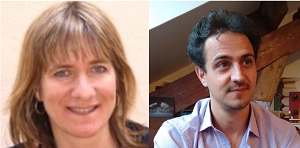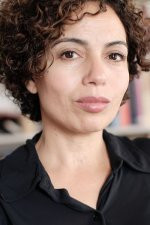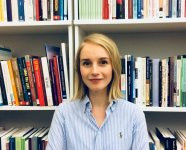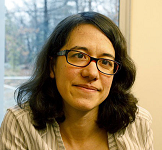2019
21 janvier 2019 - Carole REYNAUD-PALIGOT et Claude-Olivier DORON

LA RACE AU XIXe SIECLE
Carole REYNAUD-PALIGOT (Université Paris 1), "A propos de la racialisation des identités collectives aux XIXe et XXe siècles"
Cette intervention se propose de présenter quelques-uns des processus de racialisation des identités collectives des années 1850-1940 au sein des principales puissances occidentales. Une véritable culture raciale, qui a notamment trouvé source au sein du champ scientifique, a structuré les imaginaires et a servi à nourrir les identités nationales de ces Etats-nations rivaux mais aussi à légitimer leur politique coloniale.
Claude-Olivier DORON (Université Paris Diderot), "Race et libéralisme au début du XIXe siècle en France: autour du Censeur Européen"
Cette intervention reviendra sur le rôle méconnu des libéraux français du Censeur européen entre 1817 et 1826 dans l’introduction de la question des races humaines dans les sciences morales et politiques, la race devenant, au travers de leurs réflexions,un sujet/objet fondamental du politique pour interpréter tant l’histoire que le destin des sociétés. Ce sera l’occasion de comprendre les liens étroits qui unissent une certaine forme de libéralisme et le problème des races ; et comment la question des races ne saurait s’y réduire à un simple objet "négatif", relevant de l’exclusion ou de la domination. Si la question des races y apparaît essentielle pour penser l’inégalité de développement entre les sociétés et des capacités inégales d’accéder à la liberté, elle est aussi envisagée comme un étendard pour fédérer des luttes et donner aux dominés une identité, une mémoire et une histoire incorporée. On montrera donc toute l’importance et l’ambivalence de la question des races dans le moment libéral de la Restauration.
- 14-16h30, salle Alfred Sauvy, INED: 133, boulevard Davout, 75020 Paris
Discutant : Jean-Luc Bonniol (Centre Norbert Elias)
19 mars 2019 - Amade Aouatef M’CHAREK

Doing Face in Forensic Identification and Generous Methods for Studying Race
Prof. Dr. Amade Aouatef M’charek (University of Amsterdam)
The face deserves more attention. In everyday life the face is ubiquitous. Yet in social theory the face is rather absent. In this paper I want to move beyond the representational model and attend to the work that a face can do, and to what the face is capable of. I introduce the concept of the tentacular to analyze how the face draws certain publics together and how it feeds on that public to assume content and contours. My examples come for the field of forensic genetics, where DNA-phenotyping is used to produce a ‘composite face’ of the unknown individual. I will show that this novel technology is not so much aimed at the individual suspect but at a suspect population, clusters of individuals. I argue that this population is racialized through the biologization of the phenotype.
This process prompts the question: what is race? To answer this, I suggest that we need to ‘care’ for race, i.e., to invent methods that are open-ended and allow us to follow race around and examine how it shifts and changes in practice. I propose the concept of generous methods to show that the slipperiness of race is not simply a matter of ‘multiplicity’ (Mol 2002); race is not only an ‘object multiple’. As a word and a practice, race refers to different kind of things. Different realities. I will argue that the slipperiness of race can be grasped if we consider race to be an object, a method as well as a theory. Three different yet connected realities.
- 14-16h, salle Alfred Sauvy, INED: 133, boulevard Davout, 75020 Paris
Discutante : Joëlle Vailly (Iris, CNRS, coordinatrice du projet ANR "Fitege")
15 avril 2019 - Edward TELLES et Fabricio M. FIALHO

Edward TELLES (University of California, Santa Barbara), "Global Perspectives on Skin Color Inequality and Colorism"
A growing, interdisciplinary, and increasingly global literature concerns skin color and colorism, which are related to status throughout the world. The vast majority of research has investigated Western societies, where color and colorism have been closely related to race and racism. In Latin America, the two sets of concepts have particularly overlapped. In the rest of the world, particularly in Asia, color and colorism have also been important but have evolved separately from the relatively new concepts of race and racism. In recent years, however, color consciousness and white supremacy appear to have been increasingly united, globalized, and commodified, as exemplified by the global multibillion-dollar skin-lightening industry. My research is particularly concerned with the role of skin color in creating status hierarchies in Latin America.
Fabricio M. FIALHO (CERI/SciencesPo), "How States Make Race: New Evidence from Brazil"
The Brazilian state recently adopted unprecedented race-targeted affirmative action in government hiring and university admissions. Scholarship would predict the state’s institutionalization of racial categories has “race-making” effects. In this article, we ask whether the Brazilian state’s policy turnabout has affected racial subjectivities on the ground, specifically toward mirroring the categories used by the state. To answer, we conceptualize race as multidimensional and leverage two of its dimensions—lay identification and government classification (via open-ended and closed-ended questions, respectively)—to introduce a new metric of state race-making: a comparison of the extent of alignment between lay and government dimensions across time. Logistic regression on large-sample survey data from before the policy turn (1995) and well after its diffusion (2008) reveals an increased use of state categories as respondents’ lay identification in the direction of matching respondents’ government classification. We conclude that the Brazilian state is making race but not from scratch nor in ways that are fully intended.
Discutante : Graziella Moraes Silva (Graduate Institute Geneva)
- 14-16h30, salle Alfred Sauvy, INED: 133, boulevard Davout, 75020 Paris
24 avril 2019 - Nancy FONER

Racialization in an Era of Mass Migration: Black Immigrants in Europe and the United States
Nancy Foner (Hunter College and the Graduate Center, City University of New York)
Comparing Afro-Caribbean and African migrants and their children on the two sides of the Atlantic highlights how social, political, and demographic contexts and historical developments influence the nature and impact of racial boundaries and barriers --- and raises some intriguing questions. Why and in what ways are the racial barriers facing black migrants more severe in the United States than in Britain, France, and the Netherlands? At the same time, how has the history and presence of the large African American population provided black migrants and their descendants with certain advantages that they lack in Europe? Why do identity struggles of the second generation take different forms in the United States and Europe?
- 14-16h, salle Alfred Sauvy, INED: 133, boulevard Davout, 75020 Paris
6 mai 2019 - La race dans les sciences sociales françaises

Séance organisée conjointement par le projet ANR Global Race et la revue Mouvements
Autour du dossier "Intersectionnalité" coordonné par Abdellali Hajjat et Silyane Larcher.
Les intervenant.e.s reviendront sur la manière dont la question raciale est traitée dans les sciences humaines et sociales françaises ainsi que sur les débats et controverses qui l’entourent.
Avec
Juliette Galonnier et Patrick Simon, "La question raciale dans la sociologie française"
Lila Belkacem et Zacharias Zoubir,"Prendre au sérieux les recherches sur les rapports sociaux de race"
Magali Bessone, "Le sous-champ de la philosophie dans la question raciale en France"
Sarah Mazouz, "Cartographie du surplomb. Ce que les résistances au concept d’intersectionnalité nous disent sur les sciences sociales en France"
Audrey Célestine, "Rôle des universitaires ‘minoritaires’ et des porte-parole des minorités"
- 14-17h, salle de conférence, Sciences Po-CERI: 56 rue Jacob, 75006 Paris
14 mai 2019 - Carolin Schütze

“Everyone is equal”: Colour-blind attitudes in welfare practices with migrants
Carolin Schütze: PhD candidate at Lund University
In this presentation I will present a paper that explores the relationship between colour-blind attitudes and self-reported perceptions of encounters between majority and immigrant populations in Sweden. I build on existing studies showing that colour-blindness often functions as a strategy to appear unbiased while holding prejudicial attitudes. Using original survey data of welfare workers in two Swedish welfare organisations, I assess the relationship between colour-blindness and the perception of difficulty working with migrants among the welfare workers in these organisations. Results from structural equation models show that those with greater levels of colour-blindness are simultaneously more likely to report negative attitudes toward immigrants and less likely to report difficulty in working with migrants. I propose that self-reported colour-blindness among welfare workers is part of an effort to appear unbiased and in line with the normative principles of the state to perform non-racism, but this does not mean that those who are colour-blind do not hold anti-immigration attitudes.
Discutante : Haley McAvay (INED)
- 16-18h, salle 111, INED: 133, boulevard Davout, 75020 Paris.
27 mai 2019 - Béatrice DE GASQUET

Définir la judéité dans les enquêtes statistiques sur les populations juives après la Shoah (États-Unis, Royaume-Uni, France)
Béatrice de Gasquet (Université Paris Diderot, en délégation à l’INED)
La Shoah marque une rupture majeure dans les entreprises de recensement des populations juives, avec la disqualification de tout usage d’un référentiel racial pour définir la judéité, et le soupçon face à l’implication des États dans des enquêtes sur les populations juives. Mais en dehors de la statistique publique, dans le contexte plus général de l’essor du recours aux sondages, la période de l’après Seconde guerre mondiale voit aussi le développement des usages d’enquêtes par questionnaire pour dénombrer et connaitre les populations juives, notamment à l’initiative d’organisations juives.
Cette communication s’intéresse plus particulièrement aux enquêtes statistiques conduites sur des échantillons à visée représentative des personnes définies comme juives aux Etats-Unis, en France et au Royaume-Uni depuis les années 1960. Ces enquêtes constituent un cas relativement singulier où les statistiques sur une population minoritaire sont conduites par des organisations visant à représenter les personnes concernées. On s’intéressera ici aux modes de définition de la population visée dans ces enquêtes, qui prennent généralement pour acquis la complexité de cette entreprise de définition et combinent souvent plusieurs critères (religion, autodéfinition, filiation, éducation…). Les choix opérés dans ces enquêtes s’inscrivent en effet à la fois dans des débats intellectuels et politiques larges sur les identités, et dans des débats internes, et transnationaux, au sein des mondes juifs contemporains sur « qui est juif ».
Discutant : Paul Schor (Université Paris Diderot)
- 14-16h, salle Alfred Sauvy, INED: 133, boulevard Davout, 75020 Paris
15 octobre - Journée GAUCHE ET RACE

RENCONTRE DEBAT :
- 14-18h, Salle des conférences, Sciences Po-CERI, 56 rue Jacob, 75006 Paris
Cet après-midi entend revenir sur les relations entre gauche et race en deux temps : d’abord avec trois intervenant.e.s qui discuteront de la façon dont les courants intellectuels associés aux mouvements ouvriers se sont positionnés sur la question raciale aux États-Unis, en Grande Bretagne et en France, et ensuite avec une table-ronde réunissant intellectuel.le.s, représentant.e.s de formations politiques et d’organisations antiracistes.
14 -16h Keynote speakers (en anglais)
David ROEDIGER (Foundation Professor of American Studies, University of Kansas), auteur de Class, Race and Marxism (2017)
Satnam VIRDEE (Professor of Sociology, University of Glasgow, Founding Director of the Centre for Research on Racism, Ethnicity and Nationalism, CRREN), auteur de Racism, Class and the Racialized Outsider (2014)
Françoise VERGES, auteure de Un féminisme décolonial (2019)
16h15 - 18h Table ronde (en français)
Animée par Patrick Simon
Avec Hourya BENTOUHAMI
Saïd BOUAMAMA
Christine DELPHY
Danièle LOCHAK
Danièle OBONO
George PAU-LANGEVIN
Les enregistrements audio des interventions de la journée du 15/10/2019 sont accessibles ci-dessous
Introduction :
Keynote Satnam Virdee :
David Roediger :
Françoise Vergès :
Discussion avec la salle après les keynotes :
Table-ronde :
Discussion avec la salle après la table ronde :
Téléchargement
-
2019_01_Compte-rendu de la séance avec Doron et Reynaud-Paligot [PDF | 120,2 K.o.]
-
2019_03_Compte-rendu de la séance avec Amade M’Charek [PDF | 290,1 K.o.]
-
2019_04a_Compte-rendu de la séance avec Telles et Fialho [PDF | 1001,2 K.o.]
-
2019_04b_Compte-rendu de la séance avec Nancy Foner [PDF | 119,1 K.o.]
-
2019_05a_Compte-rendu de la séance sur la race dans les sciences sociales françaises [PDF | 482,3 K.o.]
-
2019_05b_Compte-rendu de la séance avec Carolin Schütze [PDF | 99,2 K.o.]
-
2019_05c_Compte-rendu de la séance avec Béatrice de Gasquet [PDF | 308,5 K.o.]
-
2019_10_Affiche Gauche et Race [PDF | 2,9 M.o.]
